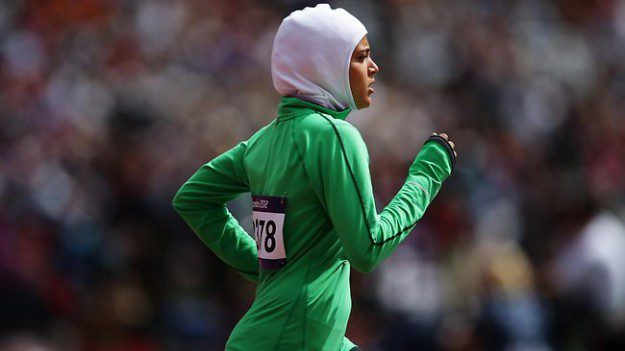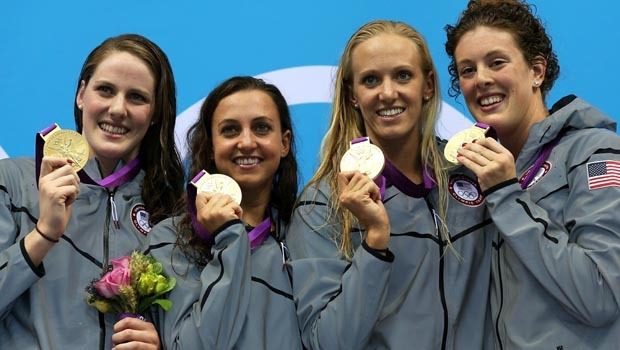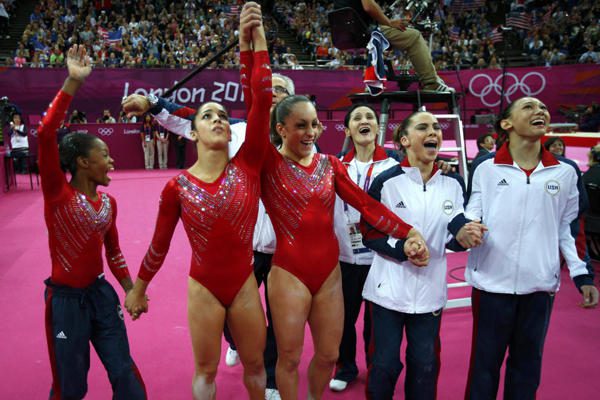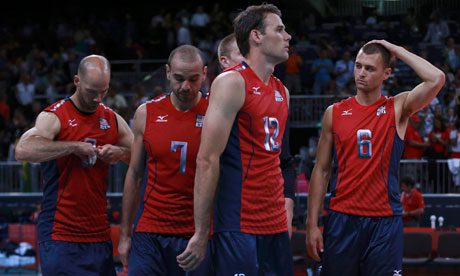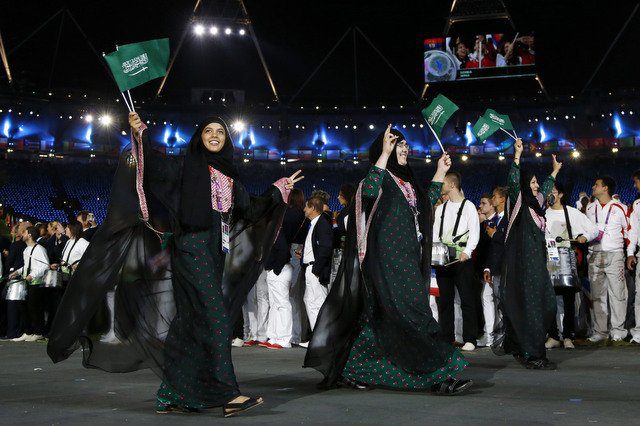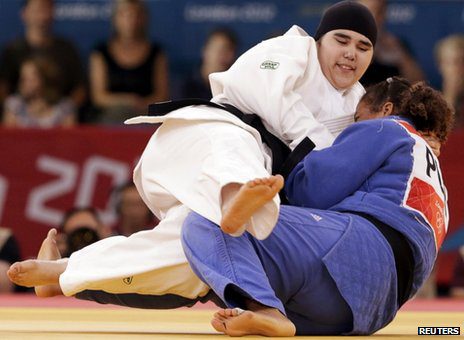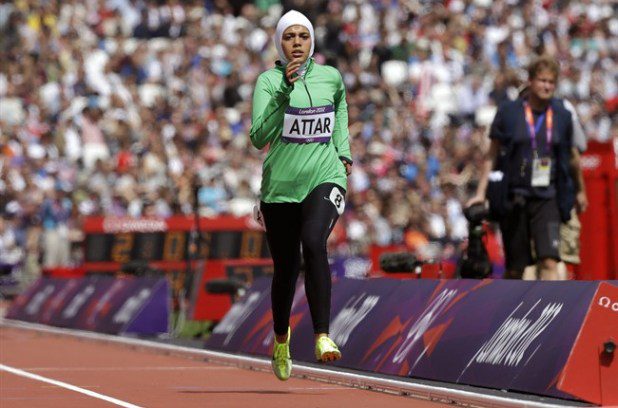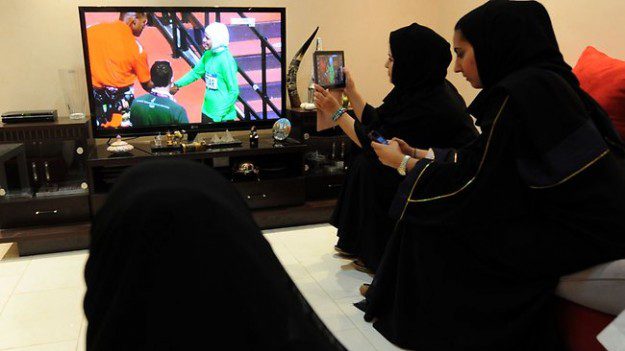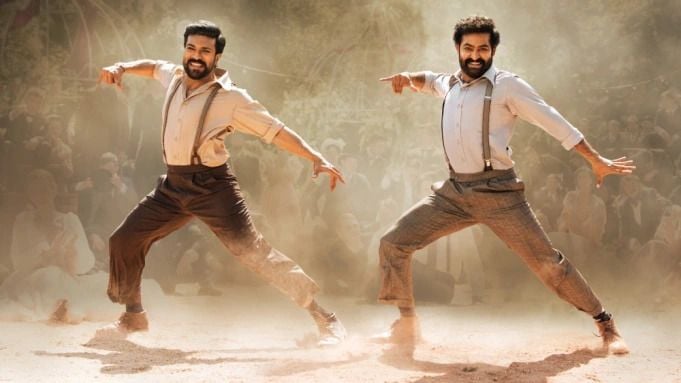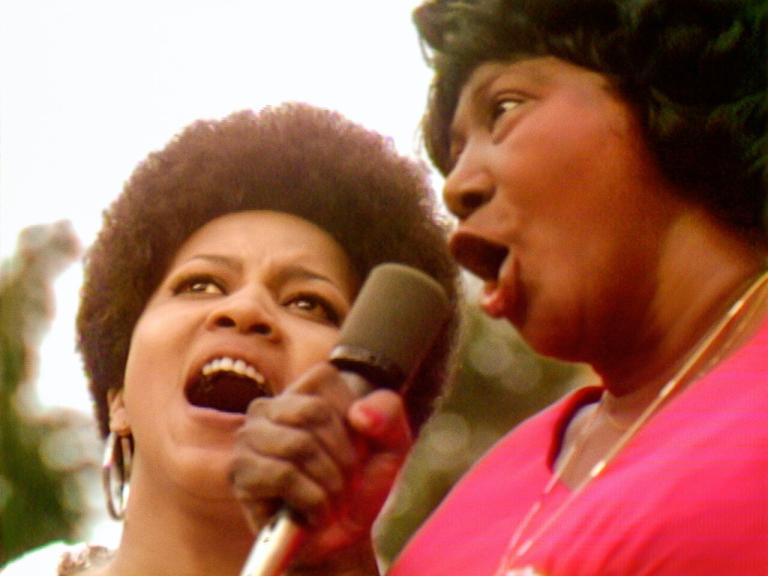What has been your favorite Olympic moment? How cool to see double amputee Oscar Pistorius compete in the 400 meters as South Africa’s ‘blade runner’. Jamaicans celebrated the remarkable speed of Usain Bolt and the Brits rejoiced in the tennis grit of Andy Murray. Americans can be so proud of our swimmers, our gymnasts, and our track and field athletes. My favorite victory came from a woman who finished last in her event. Why does Sarah Attar’s Olympic moment stand out? Allow me to explain.
For the first time, the United States Olympic delegation features more women than men. So while Michael Phelps shattered the record for most decorated Olympian of all time, the women of the United States have been most impressive. Missy Franklin raised the spirits of her Aurora, Colorado high school in the swimming pool, with Allison Schmitt, Dana Vollmer, Rebecca Soni, and Katie Ledecky each taking gold as well. Misty May-Treanor and Kerri Walsh Jennings swept their competition in beach volleyball for the third straight Olympics. Serena and Venus Williams continued their reign over tennis in singles and doubles.
Gabby Douglas and Aly Reisman led the America’s ‘fab five’ towards the team title in gymnastics. American runners like Allyson Felix in the 200 meters and Sanya Richards-Ross in the 400 meters raced to the finish line. Brittney Reese won the long jump and Jenn Suhr triumphed in the pole vault. Our women have won in cycling, in rowing, in shooting, in judo, in boxing. And the United States’ teams were victorious in basketball, water polo and soccer. Without these bold women, we’d be trailing far behind China in the overall medal count.
The United States men, especially swimmers Michael Phelps, Ryan Lochte, Cullen Jones, Matt Grevers, and Nathan Adrian performed at world-class levels. But we have mostly come up short against runners from Jamaica and Grenada. Our men’s teams failed to medal in volleyball and water polo. We’ll take consolation in our easy win in basketball. And we crowned two Americans as the World’s Greatest Athletes when Ashton Eaton and Trey Hardee took the Decathlon, but it feels as if our men aren’t nearly as dominant as our women.
Why do American women rule? It is a stirring affirmation of Title IX, a seemingly understated amendment to an Equal Opportunity in Education Act, passed by Congress and signed into law by Richard Nixon in June 1972. It guaranteed that, “No person in the United States shall, on the basis of sex, be excluded from participation in, be denied the benefits of, or be subjected to discrimination under any education program or activity receiving Federal financial assistance.” The practical working out of the provision?—an equal number of sports teams for men and women. The Department of Education made sure that Title IX covered such basic issues as equality in equipment, practice times, travel budgets, coaching salaries, locker rooms, and publicity. The number of women participating in high school and college sports has skyrocketed in the decades since; from 300,000 girls playing high school sports in 1974 to more than 3 million today. As the father of an athletic daughter, this is very good news.
Some American women may be better athletes than the rest of the world, but American women have become a dominating force because of opportunity—a chance to play (and run and kick and swim). Yes, we still have critics obsessing over Lolo Jones’ looks or Gabby Douglas’ hair. While we can still bemoan the sexism that focused more on our bikini glad champions than our skeet shooting Olympian, we have experienced considerable progress in a comparatively short time. Athletic progress has coincided with additional social and political gains (despite plenty of ongoing resistance). But perhaps the practice and determination demanded in athletics has sharpened resolve.
Perhaps the most revolutionary aspect of the London Olympics has been the first time participation of women representing each country. Under pressure from the International Olympic Committee, three Islamic countries, Qatar, Brunei, and Saudi Arabia included women on their national teams. They joined Muslim women competing for Afghanistan, Oman, Yemen, Iran, and Somalia. Some may say that Olympic participation allows the ongoing abuses in these countries to be overlooked. But I sense that the rise of a new generation of women athletes portends a brighter future for all Muslim women. They have proven that religious observation and athletic participation can definitely be combined.
Sixteen-year-old Wojdan Shahrkhani made a stir by competing for Saudi Arabia in judo. Debates about head covering nearly derailed her Olympic dream (along with jeers from her home country calling her a prostitute). Obviously, she has plenty of hurdles still to overcome back home, but a short-lived match against a far superior Puerto Rican judoku did not diminish Shahrkhani’s accomplishment.
This morning, Sarah Attar ran in the 800 meters for Saudi Arabia. In a conservative kingdom where women have yet to vote (slated for 2015) and driving a car can be an act of civil disobedience, Sarah’s appearance in the London Olympic stadium was quite a statement of possibility. Most girls schools in Saudi Arabia ban athletic activity. They cannot jog in public or go to a public gym. So how did this remarkable exception arise? Sarah was born in California but her father’s citizenship allowed her to represent Saudi Arabia. She runs for Pepperdine University (where I teach). What made her participation, training, and now Olympic moment possible (besides duel citizenship)? Title IX.
With her long sleeved green jacket, black running pants and white hijab, Sarah stood out from her fellow runners. She trailed right from the starting gun. But the crowd in Olympic Stadium rose to their feet even as Sarah finished more than a half-minute behind. They understood the symbolic value of finishing the race. United States’ runner Alice Schmidt said: “She carried the weight of Saudi Arabia’s women on her shoulders.” Afterwards, Sarah told the Associated Press, “I mean, seeing the support like that, it’s just an amazing experience,” she said. “I was so excited to be a part of it. I really hope this can be the start of something amazing.” Why we are still a long way from a time when women rule in Saudi Arabia, judging from this picture taken in Riyadh, Sarah Attar and her fellow pioneers have already started something rather amazing.

